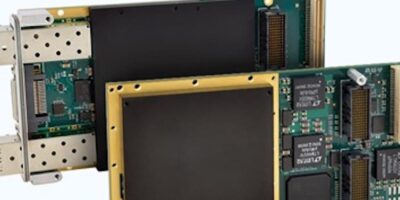Two XMC modules secure configuration with Xilinx FPGAs
Two XMC modules released by Acromag feature write-protected flash memory to prevent unwanted changes to configuration files. The XMC-7AWP and XMC-7KWP modules have a user-programmable Xilinx Artix-7 or Kintex FPGA, and feature write-protected flash memory to secure the configuration files.
The modules can be used in a range of applications such as hardware simulation, communications, signal intelligence, adaptive filtering and image processing. High-speed interfaces are provided for PCIe, 10GbE, LVDS, serial and other I/O signals.
The XMC-7KWP models offer a choice of Kintex-7 FPGAs for 325k or 410k logic cells. Dual SFP+ ports offer support for 10Gbit Ethernet with fibre or copper transceivers. A 36-pin VHDCR connector provides JTAG, USB, global differential clock pairs, and LVDS signals to the FPGA. The rear I/O XMC port offers a four-lane high-speed serial interface and supports SelectIO channels for single-ended or differential I/O. A PMC-style port supports additional SelectIO channels.
The XMC-7AWP module features a user-configurable Artix-7 FPGA with 200k logic cells. The rear I/O provides an eight-lane high-speed serial interface on the P16 XMC port, with support for 34 single-ended SelectIO or 17 LVDS channels. The P4 port adds another 60 SelectIO or 30 LVDS and global clock lines.
The FPGA mezzanine modules are “ideal for high-speed processing of custom algorithms,” commented Robert Greenfield, Acromag’s business development manager. “And they provide the added security of write-protected configuration flash,” he added.
The custom off the shelf (COTS) modules can be used for algorithmic acceleration, protocol conversion, simulation, hardware in the loop (HIL) test, motor control and image analysis, as well as sensor fusion applications. The versatile XMC mezzanine cards plug into host single board computers (SBCs) or non-intelligent carrier cards for use in PCIe servers, VPX or CompactPCI Serial chassis, and small form factor embedded computers.
The air-cooled cards operate across a wide ambient temperature range. Conduction-cooled systems can also be accommodated.




